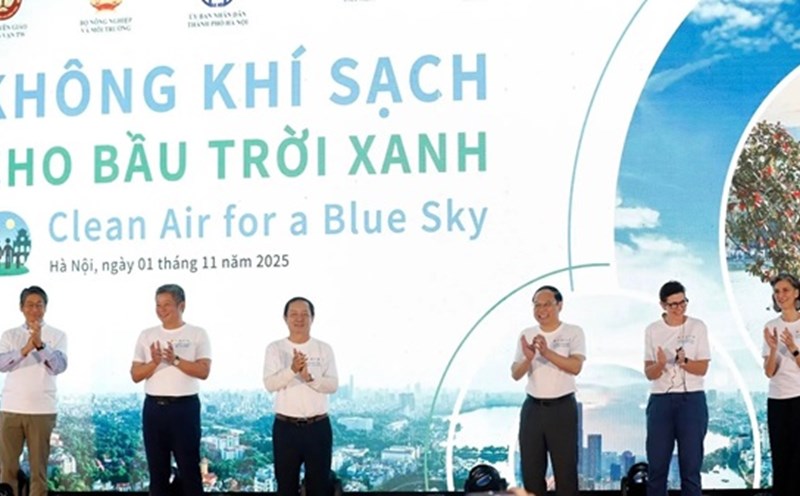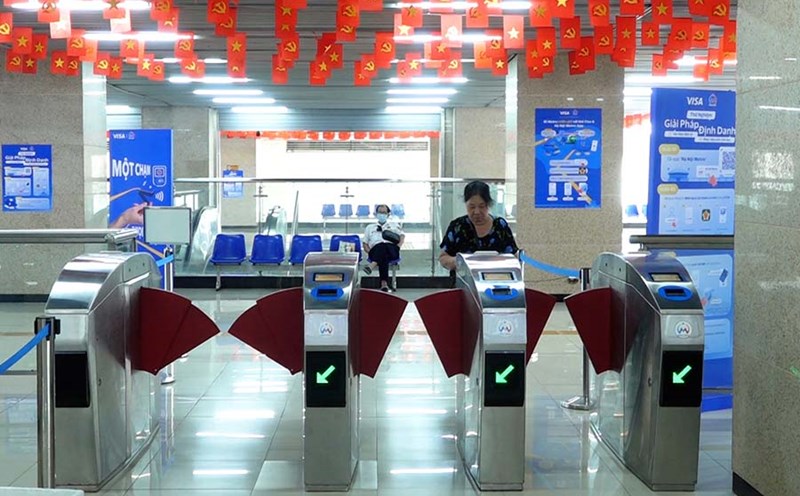Towards a green public transport system
On December 2, 2021, Hanoi's first electric bus route - E03 (My Dinh - Ocean Park) operated by Vin bus - officially merged into the capital's public transport network, creating an impression in service quality compared to traditional buses. To date, the city has had 15 electric bus routes; after Vin bus, many other businesses such as Transerco, Newway, Bao Yen, Hanoi Electric Vehicles have also gradually replaced gasoline-powered vehicles with electric vehicles.
Currently, the city has about 360 buses using clean energy, accounting for 18.5% of the total number of vehicles, exceeding the set plan.
According to Mr. Pham Dinh Tien - Head of the Planning and Operation Department (Hanoi Traffic Management and Operation Center), the electric bus routes are comprehensive in efficiency, the peak hour capacity coefficient exceeds 100%, service quality is highly appreciated, 90% of passengers are satisfied.
Transerco General Director Nguyen Thanh Nam said that in just the first 6 months of 2025, the unit has put into operation 63 electric buses on 4 routes, completing the 2026 plan early. This demonstrates the great determination of the city and businesses in building a green, high-quality public passenger transport system.
According to Resolution 07/2019/NQ-HDND, Hanoi will support 50% of bank loan interest in the first 5 years for businesses to invest in infrastructure and buy clean energy buses. However, after 5 years, only Bao Yen Company has completed the application for support for 139 CNG buses.
Many businesses have reported that the policy is still unclear, especially regarding the loan limit and project conditions that must be approved by the City People's Committee. This regulation is considered an "obstruction" that makes it difficult for them to access support, while the support level of 50% interest for 5 years is not attractive enough. As a result, despite policies, the process of "greening" public transport is still slow.
To meet the national commitment on energy conversion, the Prime Minister issued Decision 876/QD-TTg (July 22, 2022) approving the Action Program on green energy conversion, reducing carbon and methane emissions. On that basis, Hanoi has approved the "Project to develop a public transport system by electric bus, green energy" (Decision 6004/QD-UBND, dated November 18, 2024) and Plan 149/KH-UBND (May 28, 2025) for implementation.
Expecting an attractive mechanism to remove obstacles
According to the roadmap, by 2030, Hanoi must complete the conversion of all buses to electricity or green energy. To do this, the city needs to invest in more than 2,500 new buses along with a synchronous charging station and infrastructure system - requiring strong resources and mechanisms to attract businesses.
Experts say that if credit and investment problems are not resolved soon, the goal of converting to green vehicles will be difficult to achieve. Developing green transport not only helps reduce emissions and protect the environment but also improves the quality of services and the image of civilized and modern transportation of the capital. When the policy is clear, businesses will boldly invest in expanding the fleet of electric vehicles, charging stations and technical services, forming a green value chain in the transportation industry.
Hanoi Transport Corporation said that from the beginning of 2025 to now, the unit has installed 247 charging stations at 14 locations, putting 63 electric buses into operation, meeting the pilot schedule according to the city's requirements. Transerco is also studying cooperation in investing in charging stations, maintenance and repair of electric vehicles to serve the clean energy transition roadmap.
According to a representative of the Hanoi Department of Construction, by 2030 at the latest, the city will complete the conversion of 100% of the public passenger transport system to green vehicles. This agency is developing a resolution on financial support policies, investment incentives, measures to limit polluting vehicles, and a plan to develop a synchronous clean energy infrastructure.
The completion of transparent and stable mechanisms and policies will be the foundation for Hanoi to realize the goal of "greening" public transport, towards a modern city and sustainable development.











